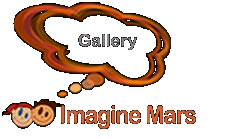Student Activities Outcomes
- Knowledge: Students demonstrate application of relevant STEM standards in their Imagine Mars learning experiences.
- Engagement: Students demonstrate an interest in Earth/Mars and/or in STEM-related careers necessary to a community through their Imagine Mars learning activities.
- Attitude: Students have a greater sense of self-efficacy in STEM-related topics and their own career potential from exposure to them through Imagine Mars.
- Skills: Students demonstrate relevant digital-age technology skills (as outlined by the National Educational Technology Standards) and use of relevant 21st Century Tools (as outlined by the Partnership for 21st Century Skills) in their Imagine Mars learning experiences.
Educator Professional Development Outcomes
- Knowledge: As provided through Imagine Mars educator training sessions and materials, educators perceive they have the knowledge of relevant STEM concepts/standards/career information needed to lead Imagine Mars learning experiences (see Table 4).
- Attitude: As provided through Imagine Mars educator training sessions and materials, educators perceive themselves as effective in achieving STEM results and sharing STEM career opportunities with their students through an Imagine Mars learning experience.
- Behavior: Educators go on to lead Imagine Mars learning experiences following Imagine Mars professional development/training.
- Skills: Educators perceive that the Imagine Mars professional development/training provided skills for teaching relevant digital-age technology skills and using 21st Century Tools in leading Imagine Mars projects.





